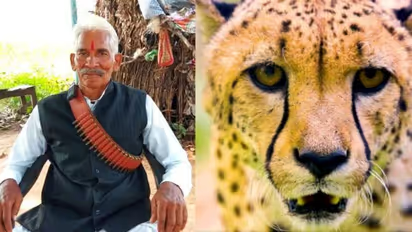Once a dreaded dacoit, Ramesh Sikarwar is today a 'Cheetah Mitra'

Synopsis
Donning a cap and sporting a 'gamcha' (cloth), Ramesh Sikarwar meets people as a 'Cheetah Mitra' and raises awareness. He tells them that the cheetah never attacks a human being and that there is no need to panic, even if it comes out of the forest.
Ramesh Sikarwar's name once terrorised people when his gang of bandits held sway on the rugged ravines of Chambal in Madhya Pradesh. Today, this 72-year-old is one among the 450 'Cheetah Mitras' roped in by the Madhya Pradesh forest department to create awareness among people about the wild cats who will make a re-entry in India seven decades after being declared extinct here.
Also read: Return of Cheetah will end major headache for farmers in Gwalior-Chambal region
The special aircraft with eight cheetahs from Namibia will land in Gwalior on September 17. Earlier, the aircraft was scheduled to land in Jaipur as part of the inter-continental translocation project. The cheetahs will then be flown to the Kuno-Palpur National Park (KPNP) in the Sheopur district of Madhya Pradesh, where Prime Minister Narendra Modi is scheduled to release three of these wild cats into the park's quarantine enclosures. The event coincides with Prime Minister Modi's 72nd birthday on September 17.
Recollecting the circumstances under which he picked up weapons and entered the Chambal ravines, Sikarwar said his paternal uncle, who had usurped his family's land, used to turn his father away whenever the latter asked him for his share of the ancestral land and livestock.
Also read: Cheetah returns to India: The 'special bird' that will fly from Windhoek to Jaipur
"I also requested my 'chacha' to give us our share of land after I grew up. However, not only did he refuse to give us our share, he also filed a police complaint against me. That was the flash point. I took my revenge and murdered him. It was then that I entered the Chambal ravines," Sikarwar said.
In a decade, there were over 70 cases of murder and up to 30 cases of abduction lodged against Sikarwar in different police stations. Sikarwar said what changed his life was the call given by Gandhian activist Rajagopal P V during the tenure of former state chief minister Arjun Singh.
At the time of his surrender in 1984, he led a gang of 32 dacoits. His gang members, too, had faced some or other injustice in their lives, he said, adding that they spent 10 years in Sabalgarh jail in Morena district before being released.
After his release from jail, Sikarwar continued to follow Gandhian values and took up the fight for the rights of the poor. He was instrumental in 200-300 tribal families getting their rights back in different ways. Today, the tribal families see him as their Messiah.
Sikarwar said forest department employees were enrolling influential persons in the society to raise awareness among people about the cheetahs. They approached him for this and told him that cheetahs were coming to Kuno National Park and would help the region's development.
He agreed, and now -- donning a cap and sporting a 'gamcha' (cloth) -- he meets people as a 'Cheetah Mitra' and raises awareness. He tells them that the cheetah never attacks a human being and that there is no need to panic, even if it comes out of the forest. In such an instance, when they come out of the forest, people should alert the nearest forest officials about it immediately, he said.
Karahal range's forest ranger Prerna Dubey said 450 'Cheetah Mitras' had been appointed who operate in rural areas and have evolved a solid information network there.
With PTI Inputs
Also Read: PM Modi to release cheetahs to Kuno National Park: Here's all you need to know
Stay updated with the Breaking News Today and Latest News from across India and around the world. Get real-time updates, in-depth analysis, and comprehensive coverage of India News, World News, Indian Defence News, Kerala News, and Karnataka News. From politics to current affairs, follow every major story as it unfolds. Get real-time updates from IMD on major cities weather forecasts, including Rain alerts, Cyclone warnings, and temperature trends. Download the Asianet News Official App from the Android Play Store and iPhone App Store for accurate and timely news updates anytime, anywhere.